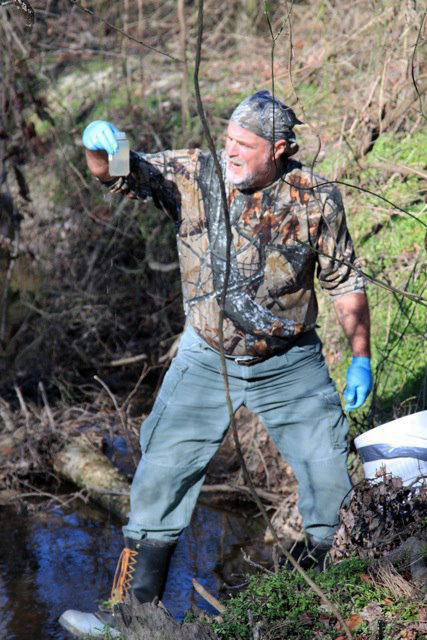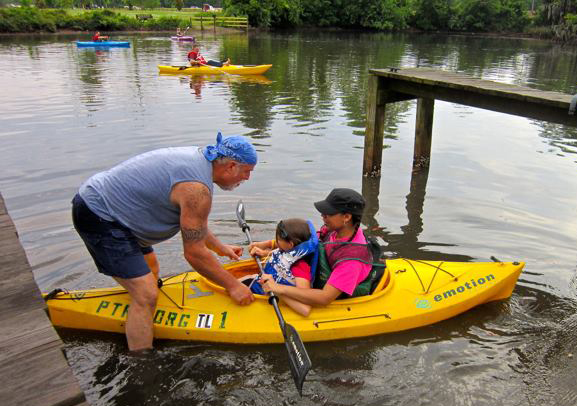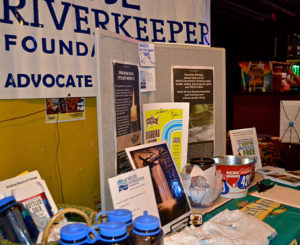
LARRY BALDWIN, NEW BERN
“I don’t have a job. I don’t have a career. I have a calling.”
Larry Baldwin went back to school fairly late in life to get a degree in environmental sciences. It was a chance meeting that took him straight to his calling — and to North Carolina and the waters of the Neuse.
The year was 2002, and the event was a panel discussion sponsored by the Chesapeake Bay Foundation. Panelists included Delaware Riverkeeper Maya van Rossum and former Neuse Riverkeeper Rick Dove.
“I asked Rick, how would one get involved in this, and he said there happened to be a position available in North Carolina. A month later, I was packing up my house in Hagerstown, Maryland, and moving to New Bern,” Baldwin laughed.
For nine years, Baldwin monitored the lower Neuse River and its tributaries, responding to complaints about construction in new developments clear-cutting beyond the buffers required at the time and reports of fish kills, which happened far more that they should have, Baldwin said.
“It became pretty clear the main issue was CAFOs. I became involved in that fairly quickly, but it was the typical issues: wastewater treatment plants, stormwater runoff,” he said.
On the job, he found resilience and perseverance were key, especially when it came to funding.
“There were times when we were like, ‘Wow, how are going to make it to the end the year? Or even the end of the month?’ But that’s not just our environmental organizations; it’s any nonprofit,” Baldwin said.
Though he had moved on by the time the Neuse Riverkeeper Foundation joined with Pamlico-Tar River Foundation to form Sound Rivers, he said the merger was a benefit to both organizations.

“If you look across the state, there are number of organizations, but it gives us the opportunity to combine a lot of the efforts. You also increase your numbers, and — in the work we do — a lot of our success is based on us being able to mobilize and engage the members that we do have. There were some very real commonalities between the two organizations, but now you have a bigger pool of people, of members and volunteers, to draw on, who are now all a part of the same family,” Baldwin said.
Now the Crystal Coast Waterkeeper with Coastal Carolina Riverwatch, Baldwin said the work of waterkeepers everywhere has not changed much over his years as a Riverkeeper.
“It’s not getting any easier. You would think in this day and age that, by now, people in general would know we cannot treat our planet the way we have and not have bad results,” he said. “There’s more political influence on what is happening to our water quality, and it’s getting worse, not better. Water doesn’t belong to one party or the other, and it certainly doesn’t belong to industry. I see more industry — big industrial, big ag, big pharmaceutical — having more influence on our water, with little regard to consequences that happen as a result. … We cannot keep treating our water resources as a commodity that can be bought and sold.”
When Baldwin thinks of the future, he thinks about his 3-year-old grandson, and wonders what that future will hold for the next generations, especially when it comes to clean water.

“Basically, what you’re seeing is the bad stuff every day. Sometimes you go home at end of the day and say, ‘What did I accomplish?’ Not everybody can do this job, because you have to put this job in perspective, even when you don’t always know what the perspective is,” Baldwin said. “I guess the really frustrating thing about this is we’re not learning from our mistakes. It’s almost like we’re using our mistakes to make excuses for more mistakes.”
Baldwin says perseverance is what kept the NRF and PTRF going, both separate and together as Sound Rivers, and that same perseverance keeps many Waterkeepers doing work that is often intangible.
“It’s not just about what we’ve accomplished — it’s about what we’ve prevented from happening,” Baldwin said. “It’s the most frustrating job I’ve ever loved.”
